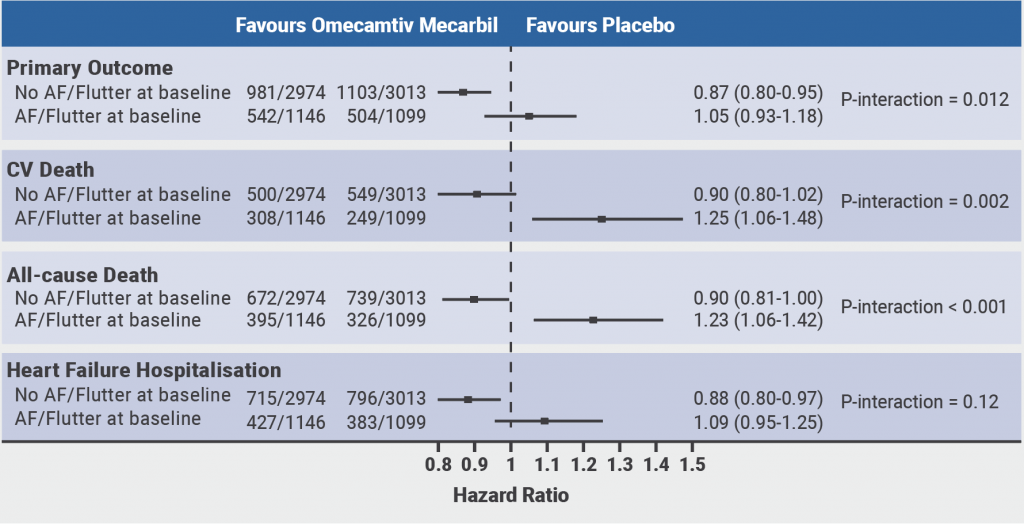That trial (https://bit.ly/38S5DeO) found that patients with an ejection fraction of less than 45% who were randomized to a target dose of 10 mg vericiguat daily had a lower risk of CV death and HFH than those who received placebo. All patients were also receiving guideline-directed therapies for HF.
In the new study, the authors compared outcomes in three subgroups of VICTORIA participants based on index HF event: 3,378 patients who had HFH within the previous three months; 871 who were enrolled within three to six months of HFH; and 801 patients who received outpatient intravenous diuretics for worsening HF in the past three months but were not hospitalized.
Over follow-up of a median 10.8 months, primary event rates were 40.9, 29.6 and 23.4 per 100 patient-years, respectively. The patients with HFH less than three months previously were at significantly increased risk compared with the outpatient group (adjusted hazard ratio, 1.48), and the closer they were to their index HFH, the higher the risk.
All three groups had a reduced risk with vericiguat, and there was a trend toward increased benefit with increased time since HFH, the researchers report in JAMA Cardiology. This paper was also presented November 13 at the American Heart Association Scientific Sessions 2020 virtual conference.
"The time period immediately following a HFH is an especially vulnerable period, during which patients are at particularly high risk of recurrent HFH or cardiovascular death despite being on guideline-directed medical therapies for HF," Dr. Carolyn S. P. Lam of the National Heart Centre Singapore and Duke-National University of Singapore, the study's first author, told Reuters Health by email.
"Vericiguat, the novel soluble guanylate cyclase stimulator tested in the VICTORIA trial, was effective in reducing the primary composite of HFH or cardiovascular death when added on top of guideline-directed medical therapy, across the range of time index HFH/ worsening HF event to six months," she added.
"We found an interesting trend towards greater treatment benefit from vericiguat with increasing time from HF hospitalization, suggesting that further study is warranted in patients beyond the vulnerable six months post-HF hospitalization to more 'stable' outpatients," Dr. Lam noted.
"Beyond hospitalized patients, VICTORIA also included patients given intravenous diuretics on an outpatient basis for worsening signs and symptoms of HF," she added. "All such patients with worsening HF despite receiving guideline-directed medical therapies for HF should be recognized for their high risk of recurrent events, and efforts should be made to optimize outcome-improving medical therapies, rather than merely focusing on diuresis."
The VICTORIA trial was funded by Merck Sharp and Dohme Corp, a subsidiary of Merck and Co., and Bayer AG. Dr. Lam and several coauthors reported financial ties to the companies.
By Anne Harding
SOURCE: https://bit.ly/3nytgNu JAMA Cardiology, online November 13, 2020.
Posted on
Previous Article
« Lorlatinib surpasses crizotinib as first-line treatment for advanced ALK+ lung cancer Next Article
Sentinel-lymph-node biopsy has edge on lymphadenectomy in endometrial-cancer staging »
« Lorlatinib surpasses crizotinib as first-line treatment for advanced ALK+ lung cancer Next Article
Sentinel-lymph-node biopsy has edge on lymphadenectomy in endometrial-cancer staging »
Related Articles

October 30, 2023
Catheter ablation saves lives in end-stage HF with AF


© 2024 Medicom Medical Publishers. All rights reserved. Terms and Conditions | Privacy Policy
HEAD OFFICE
Laarderhoogtweg 25
1101 EB Amsterdam
The Netherlands
T: +31 85 4012 560
E: publishers@medicom-publishers.com

